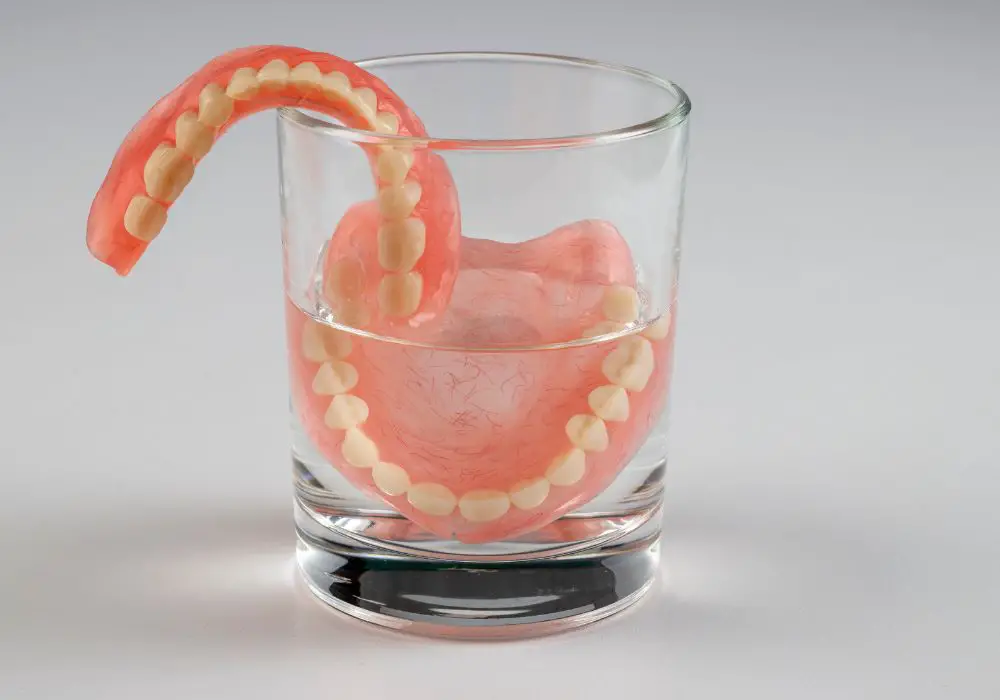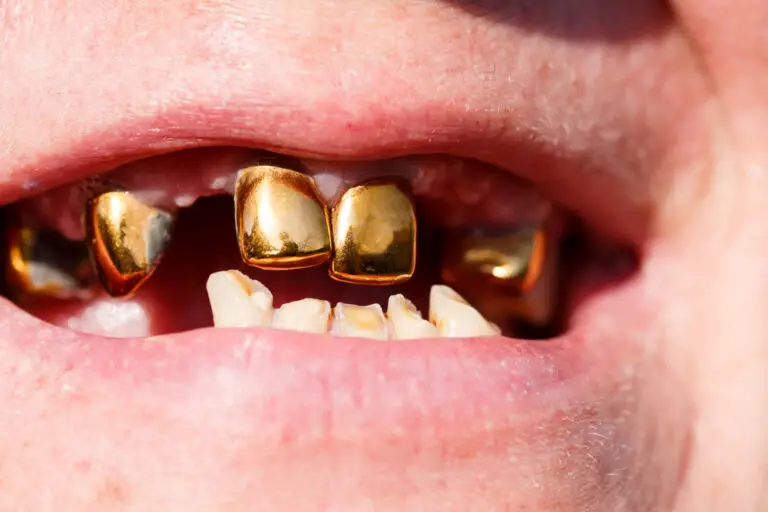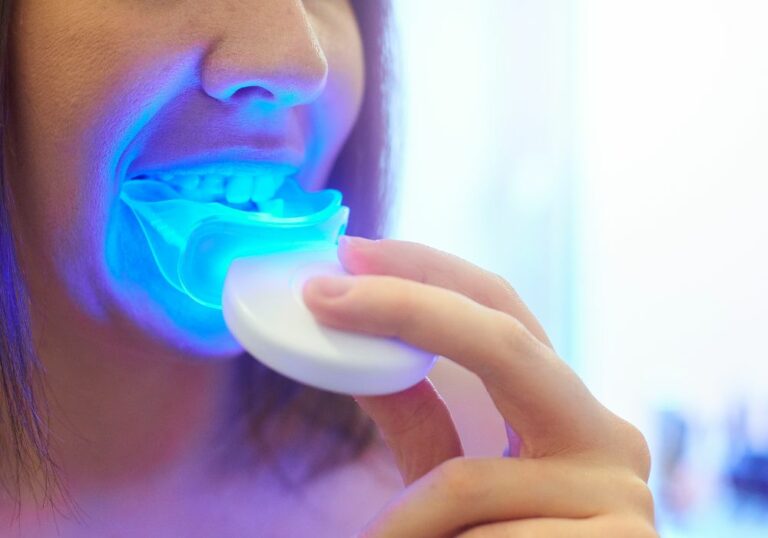If you’re considering getting false teeth, you may be wondering if they will feel weird. The short answer is yes, they probably will feel weird at first. But don’t worry, this is completely normal and to be expected. In fact, it can take several weeks or even months to get used to the feeling of wearing dentures.
When you first get your false teeth, you may experience some discomfort or sore spots in your mouth. This is because your gums and mouth are not used to the pressure and rubbing of the dentures. You may also find that your speech is affected, and it may take some practice to speak clearly and confidently with your new teeth. But with time and patience, these issues will improve and eventually disappear.
It’s important to remember that everyone’s experience with false teeth is different, and what feels weird to one person may not feel weird to another. Some people adjust to their dentures quickly and easily, while others may take longer. The key is to be patient and gentle with yourself as you get used to your new teeth. With time and practice, you’ll soon be able to enjoy all the benefits of a beautiful, healthy smile.
Understanding False Teeth

If you have lost your teeth, you may be considering getting false teeth, also known as dentures. False teeth can help you regain your ability to eat, speak, and smile with confidence. However, you may be wondering if false teeth feel weird or uncomfortable.
At first, it is common to experience some discomfort when wearing false teeth. Your gums may feel sore or irritated, and your dentures may feel loose or unsecured. It may take a few weeks for you to get used to wearing them and doing normal tasks like chewing, swallowing, and speaking.
One of the most important things to keep in mind when getting false teeth is to make sure they fit properly. Ill-fitting dentures can cause sore spots in your mouth, stomach problems from not being able to chew food properly, and changes in your facial features. If your dentures do not fit well, be sure to see your dentist to get them adjusted.
It is also important to take care of your false teeth properly. Be sure to clean them daily with a soft-bristled brush and denture cleaner. Avoid using toothpaste, as it can be too abrasive and damage your dentures. Additionally, be careful when handling your dentures, as they can be fragile and easily broken.
Overall, false teeth may feel strange or uncomfortable at first, but with proper care and adjustment, they can help you regain your ability to eat, speak, and smile with confidence.
Initial Experience with False Teeth
If you’re new to wearing false teeth, the initial experience can be both exciting and daunting. Here are some things you can expect during your adjustment period.
Adjustment Period
It’s normal to feel a bit uncomfortable or even strange when you first start wearing false teeth. You may experience sore spots, irritation, or difficulty speaking or eating. Don’t worry, these are all temporary side effects that will pass.
During the adjustment period, it’s important to follow your dentist’s instructions on how to care for your false teeth. Proper cleaning and maintenance will help ensure that your false teeth fit well and feel comfortable.
Speaking and Eating Challenges
Speaking and eating with false teeth can be challenging at first. You may find it difficult to pronounce certain words or sounds, and you may need to practice speaking slowly and clearly.
Eating can also be a bit tricky as you adjust to your new teeth. Start with soft foods and take small bites. Avoid sticky or hard foods that could damage your false teeth.
As you get used to wearing false teeth, you’ll find that speaking and eating become easier. With a bit of patience and practice, you’ll be able to enjoy your favorite foods and converse with confidence.
Remember, it’s normal to feel a bit self-conscious or anxious about wearing false teeth. But don’t let that hold you back from living your life to the fullest. With time and patience, you’ll adjust to your new teeth and feel more comfortable and confident than ever before.
Physical Sensations of False Teeth

When you first get false teeth, it is normal to experience some physical sensations that may feel strange or uncomfortable. However, with time and proper care, you will get used to the sensations and your false teeth will feel more natural. Here are some common physical sensations you may experience:
Taste Sensation
False teeth can affect your sense of taste, especially if they cover the roof of your mouth. This is because the roof of your mouth contains taste buds that help you taste food. False teeth can also trap food particles, which can affect your taste sensation. However, with proper cleaning and care, you can maintain good oral hygiene and reduce the impact on your taste sensation.
Pressure Sensation
False teeth can also cause pressure on your gums, which can feel uncomfortable at first. This is because your gums need time to adjust to the new pressure and shape of your false teeth. You may also feel pressure on certain areas when you bite or chew. However, this discomfort should subside as your gums become accustomed to the new pressure.
To alleviate pressure and discomfort, you can try using a denture adhesive or adjusting the fit of your false teeth. Your dentist can also make adjustments to your false teeth to ensure a comfortable fit.
Overall, it is normal to experience some physical sensations when you first get false teeth. However, with proper care and adjustments, you can reduce discomfort and enjoy the benefits of a healthy, beautiful smile.
Psychological Impact of False Teeth
Wearing false teeth can have a significant psychological impact on an individual. It can affect their self-confidence and social interactions. In this section, we will discuss these issues in more detail.
Self-Confidence
One of the primary psychological impacts of false teeth is a decrease in self-confidence. Many individuals who wear false teeth feel self-conscious about their appearance and worry that others will notice their dentures. This can lead to feelings of embarrassment and shame.
If you are experiencing a lack of self-confidence due to your false teeth, there are several things you can do to boost your self-esteem. For example, you can try practicing positive self-talk, focusing on your strengths, and setting achievable goals. You can also speak to a therapist or counselor who can help you work through your feelings of self-doubt.
Social Interactions
Wearing false teeth can also impact an individual’s social interactions. Some individuals may feel uncomfortable eating or speaking in public, which can lead to social isolation. They may also avoid social situations altogether, which can lead to feelings of loneliness and depression.
If you are struggling with social interactions due to your false teeth, there are several things you can do to improve your situation. For example, you can practice speaking in front of a mirror or with a trusted friend. You can also try eating soft foods or cutting your food into smaller pieces to make it easier to chew. Additionally, you can seek out support groups or social activities where you can connect with others who are going through similar experiences.
In conclusion, wearing false teeth can have a significant psychological impact on an individual. It is important to address these issues and seek out support to improve your self-confidence and social interactions.
Maintenance and Care of False Teeth

Taking care of your false teeth is important to keep them looking and feeling their best. Here are some tips for maintaining and caring for your false teeth.
Cleaning Routines
It is important to clean your false teeth every day to prevent plaque buildup, bad breath, and other dental problems. Here are some cleaning routines to follow:
- Rinse your false teeth after eating to remove any food particles.
- Brush your false teeth at least twice a day with a soft-bristled brush and non-abrasive toothpaste.
- Soak your false teeth in a denture cleaner or a mixture of water and vinegar for at least 20 minutes once a week to remove any stains or bacteria.
- Use a soft-bristled brush or a denture brush to clean any hard-to-reach areas.
Regular Check-Ups
Regular check-ups with your dentist are important to ensure that your false teeth fit properly and to identify any potential problems. Here are some things to keep in mind:
- Visit your dentist at least once a year for a check-up.
- If your false teeth become loose or uncomfortable, schedule an appointment with your dentist as soon as possible.
- Your dentist may recommend adjustments or replacements to your false teeth if they become worn or damaged.
By following these tips, you can keep your false teeth looking and feeling their best. Remember to always consult with your dentist if you have any concerns about your false teeth.
Alternatives to False Teeth
If you are missing teeth, there are alternatives to false teeth that may be a better fit for you. Here are two popular options:
Dental Implants
Dental implants are a popular alternative to false teeth. They are titanium fixtures that are surgically inserted into your jawbone and act as anchors to hold in your replacement teeth. Dental implants are a great option for people who are looking for a more permanent solution to missing teeth.
Dental implants are also more natural-looking and comfortable than false teeth. They are also easier to care for and maintain. However, dental implants can be more expensive than false teeth, and the procedure can take several months to complete.
Bridges and Crowns
Another alternative to false teeth is bridges and crowns. Bridges are used to replace one or more missing teeth, while crowns are used to cover a damaged or decayed tooth. Both bridges and crowns are made from a variety of materials, including porcelain, gold, and metal alloys.
Bridges and crowns are a good option for people who are missing one or a few teeth. They are also less expensive than dental implants, and the procedure can be completed in a shorter amount of time. However, bridges and crowns may not be as natural-looking or comfortable as dental implants.
When considering alternatives to false teeth, it is important to consult with your dentist to determine which option is best for you. Factors such as cost, comfort, and durability should be taken into consideration before making a decision.
Frequently Asked Questions
How long does it take for dentures to feel normal?
It can take some time for you to get used to wearing dentures. It may take a few weeks or even a few months for your dentures to feel completely normal. During this time, you may experience some discomfort or soreness, but this should go away as your mouth adjusts to the dentures.
What does false teeth feel like?
False teeth can feel different for everyone. Some people may find that their dentures feel bulky or uncomfortable at first, while others may not feel anything at all. It’s important to remember that everyone’s experience with dentures is unique, and it may take some time to adjust to wearing them.
Are all false teeth uncomfortable?
Not all false teeth are uncomfortable. With modern denture technology, dentures can be made to fit comfortably and securely in your mouth. However, it’s important to remember that it may take some time for your mouth to adjust to wearing dentures, and you may experience some discomfort or soreness during this time.
How to loosen tight dentures
If your dentures feel too tight, you can try soaking them in warm water for a few minutes to help loosen them. You can also try using a denture adhesive to help keep your dentures in place without having to rely on a tight fit.
My dentures make me look like a horse
If your dentures make you feel self-conscious about your appearance, you can talk to your dentist about adjusting the shape or size of your dentures. Your dentist can work with you to create dentures that look and feel natural, and that help you feel confident and comfortable.
Why do my bottom dentures hurt?
If your bottom dentures are causing you discomfort or pain, it may be because they are not fitting properly. You may need to have your dentures adjusted or relined to ensure a comfortable and secure fit. It’s important to talk to your dentist if you are experiencing any discomfort or pain with your dentures.







